- Home
- Michael Crichton
Odds On: A Novel Page 2
Odds On: A Novel Read online
Page 2
Two weeks before, he had been dreaming of this summer vacation with Jenny. As he sat in his little room in Eliot House, overlooking the traffic on Boylston Street, he had planned an idyllic two months on the Continent. His dreams had carried him through three weeks of exams at the end of his junior year, but now they seemed totally wrecked.
She continued to refuse to sleep with him until they were married. It was the same old line she had used for months in Cambridge, and he still could not soften her, though God knew he’d tried.
When she had agreed to meet him secretly in Paris, he had assumed she intended to sleep with him. After all, it was ridiculous for two people to travel together for eight weeks and never go to bed together, wasn’t it?
Separate rooms, good-night kisses. Christ.
He felt cold water on his back, and looked up to see Jenny shaking her hand over him. “Thanks,” he said.
“My, you’re cheerful today.” She dropped down on a mattress next to him and began to comb her dark blond hair.
“You can’t blame me.”
“I don’t blame you. I just don’t understand why you take this attitude, as I’ve told you before. You act like you’re being cheated, and you’re not. I wish you’d stop being such a bore about it.”
“I’m sorry you find me boring.”
Jenny sighed, looked up at the sun, and said nothing.
“Maybe we shouldn’t travel together anymore,” he said, chewing his lip. It was a nervous habit.
“Whatever you think best.”
He looked at her quickly and realized she was serious. She would be perfectly happy without him and would probably visit family friends in Switzerland or Amalfi. The thought sent a cold shiver down his spine. He let his eyes travel from her face to her body. As always, it tempted him—the firm, large breasts, the small, supple waist, the long, slimly muscled legs. Jenny was a big girl, almost 5’8”, with the kind of expansive exuberance typical of girls from the western states. In Jenny’s case, the state was Texas. Her father was in the oil business, and though she once complained about how hard it was to make money in oil these days, she also complained that if she hadn’t gone to Wellesley, she would have been able to keep her Porsche at school.
Peter had flown out to her home in Midland, Texas, over Christmas, and had met the old man. Big Jack Cameron. A hearty, informal, somewhat coarse bull of a man who smoked Havana cigars, handed out St. Christopher medals to his friends (he wasn’t Catholic) and had big, beefy hands and red cheeks. Jenny always called him “Daddy.” Peter always called his own father, who was in banking, “Father,” or—in rare moments of intimacy—“Dad.” It was, he reflected, the difference between Massachusetts and Texas.
Jenny wore a black one-piece bathing suit, a nice one with a deep-plunging neckline which showed the full globes of her breasts, but somehow the fact that it was one-piece and not a bikini represented all his problems in his eyes.
Jenny rubbed herself briskly with the towel, and lay back on the mattress. She bent one leg, and Peter looked at the slim knee, the tapering thigh, and the lovely smooth line of her calf. Damn it all!
She raised her head and ran her fingers over her chest just below her collarbone. “Am I peeling?”
Peter tried to concentrate on the peeling and not the breast. “I don’t think so.”
She smiled, showing her dimples, and he thought again how deceptively angelic she looked, “I hope not. Pass me the suntan cream, will you?”
“Want me to rub it on?”
“I’ll do it,” she said, taking the tube. “Thanks anyway.”
He lay back and stared at the hot sphere of the sun through half-closed eyes. She never gave him a chance, never an opening, never an opportunity. It was always like this, and he had a feeling it would continue—unless he could do something to change the entire situation. Perhaps a change of scenery. Cannes was pleasant, but too familiar. They had each been here before.
Abruptly, he recalled the leaflet he had glanced through at the travel agency the day before. He needed someplace new and isolated, someplace elegant, yet out of the way. That hotel might be the answer. He tried to remember what the brochure had said: three hundred rooms, four dining rooms, hairdresser, shops, nightclub, swimming pools, and tennis courts. An isolated, complete little luxury community on the Costa Brava.
It was worth a try.
“I’m tired of Cannes,” Peter said. “Let’s go somewhere else.”
She looked over at him, shading her eyes from the sun. “Are you serious?”
“Yes.”
“What do you have in mind?”
“Spain.”
“Too far,” she said, closing her eyes and lying back.
“We could make it in two days.”
“The Costa Brava?” She opened her eyes and looked at him with new interest. And excitement? He couldn’t be sure.
“Yes,” he said. “I know a place.”
“It’s a thought,” she said. “Why don’t we talk about it later? I want to sleep for a while.”
“Okay. We’ll talk about it later.”
Suddenly feeling much better, he lay back in the sun and relaxed.
Jenny Cameron did not sleep, though she pretended to. As her bathing suit dried and the sun beat down on her, she was filled with a vague but powerful desire. She shifted uncomfortably, and rolled over on her stomach. She wanted a man; it had been months now since the last time, and she was growing increasingly convinced that Peter would never fill the bill.
Her father had put his finger on it last Christmas. After he met Peter, he had said to her privately, “Get yourself a man, Jen. You’ll tear this kid apart someday.”
She hadn’t taken Daddy’s advice. She had hoped Peter would relax in Europe, once he was away from the grinding snobbery of Harvard, and become natural. Peter was good-looking, and he appealed to her, whenever he was able to forget that he hadn’t made Porcellian, despite his good family, his English-tailored clothes, and his new Jag. It was a nice car, an XKE in British racing green, but Peter’s attitude toward it was typical; he insisted on calling it a “Jag-u-ar,” in the British manner. It was sad. Apparently, Peter was not going to relax, and that was too bad, for it meant that she would have to find another man, and she knew from experience that the men who could satisfy her were few and hard to find.
Now Peter wanted to go to Spain. Did he think that she would climb into bed just because it was a Spanish bed, and not a French one? If he did, he was being foolish, and he would soon learn it. On the other hand, perhaps he might finally loosen up in Spain, under the influence of a different environment. Almost without realizing it, she felt her thighs begin to rub together, slowly, up and down. She stopped herself with an effort. She would give him one last chance, she decided, in Spain.
GERONA, SPAIN: Miguel drove fifteen kilometers out of town, and pulled off onto a dusty dirt track. He followed this for about three kilometers, until he came to a grove of pine trees at the edge of the road. He pulled into the grove and parked. For acres in every direction, there was nothing to see but fields of yellowish wheat, waving gently in the hot breeze. No one was about; it was, after all, Sunday in a deeply religious country. He got out of the car and opened the trunk, removing the small, empty suitcase that was no larger than an overnight bag. That empty suitcase might have caused trouble if the customs people had checked, but he was prepared with a story. He had bought it to carry all the souvenirs he planned to buy.
He opened the suitcase and laid it out on the ground. Then he placed the package containing the dynamite inside, padding it with newspaper. The blasting caps and batteries were removed from the underside of the dashboard and added; then the small cannister of tear gas. Finally he packed something of his own—a small automatic pistol and two clips of ammunition. Satisfied, he snapped the suitcase shut and locked it. It was heavier than hell, but he would carry it himself and nobody would be the wiser.
He checked his watch—11:30. Another hour to the h
otel, an hour and fifteen minutes if he got lost. He had plenty of time. He would drive slowly, in deference to his headache, the result of his drunk the night before with that girl. The one with the big boobs and the rolls around her stomach—he had forgotten her name. Hell, why should he even try to remember?
BARCELONA, SPAIN: The landscape of Spain, bone dry and dust brown, spread 20,000 feet below. It was vast, rugged, majestic, and monotonous—rather like Nevada, Jencks thought. He stared out the airplane window and tried to ignore the other passenger at his side. It wasn’t easy.
“Been in Spain long? I’ve been here six years, myself.”
Jencks had changed planes in Madrid, making connections for Barcelona. And he had found himself seated next to this idiot—a heavyset, sweating fellow dressed in a seersucker suit. The man’s collar was damp, his jacket limp, his balding head beaded despite the air-conditioning.
“No. I just arrived.”
“You’re American?”
“That’s right.”
“I thought so. From your accent,” the man explained. “What brings you to old Espanol?”
He’s been here six years, Jencks thought. Six years my ass.
“A little pleasure. I’m on vacation.”
“Wonderful place for a vacation. Marvelous, I can tell you. When I first came here, I traveled all over. All over. Marvelous. My name’s Alan Brady, by the way.”
He held out a sweating hand.
“Steven Jencks.”
“Steve, good to know you. How about a drink?” Brady clutched Jencks’ hand determinedly.
“Fine.”
The hand was released in order to press the call button for the stewardess. Brady’s arm was thrown across Jencks’ shoulder. It was damply hot on his neck. “I’m an agricultural engineer,” Brady said. “What’s your line?”
“That sounds interesting. What exactly is an agricultural engineer?”
The stewardess came, a coldly pretty girl. They ordered drinks, and Brady leaned into the aisle to watch her leave. “That’s what I do,” he said, nodding toward her buttocks. “I cultivate. I sow and reap.” He smiled. “Sow and reap.”
“Pleasant. Where do you live?”
“Seville. Ever been to Seville? Marvelous place. But you were saying.…”
“I’ve never been to Seville.”
“No, I meant your business.”
“Ah. I’m an industrial designer. Automobiles.”
“Automobiles! Marvelous. I’m a great fan of automobiles. Have a Ford Galaxie over here myself. Wouldn’t be without it, I can tell you.”
“Air-conditioned, I hope,” Jencks said, looking out at the landscape.
“Well, of course.”
“Aren’t taxes rather prohibitive on an American car?”
Brady frowned. “Not really. How long have you been designing automobiles?”
“Ten years. My specialty is taillights.” As soon as he said this, Jencks felt instinctively that it was a mistake. This man was not a fool, though he was trying to appear so. He reacted to Jencks’ statement with nothing more than the slightest narrowing of the eyes, but it had clearly been absorbed.
“They’re integral to the design,” Brady said.
The drinks came.
“Well, cheers.” Brady threw his back with a single gulp. “One thing I’ll never get used to about Europeans. They drink hard stuff like it was deadly poison—sip at a time, twice yearly. Know what I mean?”
“I haven’t traveled much.”
“Well, you’ve picked a good place this time. Where are you spending your vacation? In Barcelona itself?”
“No, outside.”
“I can recommend Torremolinos. Perfect weather, good people—if you don’t mind Germans, which unfortunately I do—and lots of snatch. You’ll want to watch your Barcelona girls, by the way. They can really clap it to you!” He let out a hearty guffaw, and slammed his hand down on Jencks’ shoulder. The drink sloshed all over Jencks’ trousers.
“Oh, damn. That’s terrible of me. I’m always doing this sort of thing, really inexcusable.” Brady whipped out a handkerchief and dabbed at Jencks’ clothing, pushing up against him in a gesture of impulsive contrition. For the briefest instant, Jencks wondered if the man were queer, but when Brady straightened and sat back in his own seat, he knew better.
“Really sorry about that,” Brady said, pulling at one heavy cheek. “I’m awful damn clumsy.”
You’ll have to do better than that, Jencks thought. Much better, very fast.
Brady smiled, hot and uncomfortable. He loosened his tie. Jencks said nothing, just stared. Brady’s smile tightened, and he suddenly stood up.
“Jesus, I’ve gotta take a leak. Why don’t you order another round? On me—it’s the least I can do.” He walked aft, toward the bathroom.
Jencks did not watch him go. He reached up and patted his breast pocket. It was gone. Quite neatly done, almost perfect. He sighed, and looked out the window. This was a very disturbing turn of events, but not because of anything Brady might discover—there was nothing—but because something Jencks had said or done had obviously prompted suspicion.
That was quite upsetting.
He reached up, pressed the call button, and ordered another round of drinks. Idly, he wondered how Brady would return it to him. Probably with another display of finesse that just fell short of perfection.
But why?
He reviewed their conversation, and found nothing in it that suggested anything unusual. He shrugged.
Brady returned. “Much better,” he said, dropping down. “Much better. Are the drinks coming?”
“Yes.” Careful, Jencks thought. Just a touch of sullen irritability, but not enough to make him suspect you know.
Brady extended his hand again. “Jesus, I really am sorry. Shake on it?”
Despite himself, Jencks smiled. He did play it well. “Sure.”
“No hard feelings,” Brady smiled, and slapped his hand on Jencks’ knee. “That’s what I like about Americans—forgive and forget.”
“Right,” Jencks said.
Twenty minutes later, the stewardess announced in Spanish, French, and English that the plane was about to land in Barcelona—“Barthelona,” with her Castilian accent. The weather was clear; the temperature on the ground 32 degrees Centigrade.
“How much is that?” Brady asked.
Before Jencks could answer, the stewardess announced it—90 degrees Fahrenheit. Brady groaned.
The plane circled and came down. It taxied to a stop, and the passengers stood to collect their hand luggage. Jencks was shrugging into his raincoat when Brady nudged him and pointed to the floor.
“That yours?”
Jencks looked down. A small leather wallet lay at his feet. He picked it up.
“Yes. My passport. How do you suppose that happened?”
Brady shrugged. “Must have dropped it somewhere along the line.”
Jencks slipped it into his breast pocket. “I guess so.”
They went through the airport, and out into the taxi ranks. “Going into town?” Brady asked. “Maybe we can share a taxi.”
“All right,” Jencks said. On the way in, he pretended to be fascinated with the view, not wishing to talk to Brady. The heavy man did not seem disturbed, however; he maintained a steady stream of chatter, discussing the city, its history, current position and problems. He seemed quite knowledgeable.
When they reached the center of town, Brady said, “Which is your hotel?”
“Arycasa,” Jencks said.
Brady gave brief instructions to the driver in terrible Spanish. Jencks frowned, and Brady said, “I have a bad ear for languages. Always have. You should have heard me four years ago.”
Four years? Six years? Jencks said nothing.
“I can’t afford a place like the Arycasa, myself. I’m going to the Regente.”
Jencks could see it coming. He did not want to meet for a drink. “I wish we could meet somewhere along the l
ine,” he said, “but I’m going to be rather busy here.”
“Thought you were on vacation.”
Jencks allowed himself a slight smile. “I’m meeting a girl.”
“Oh, you devil!” Brady pounded Jencks’ back.
Mercifully, they came to the hotel, and Jencks got out. He shook hands, collected his luggage, and went inside.
His room was pleasant, though Jencks was not in the mood to appreciate it. He paced up and down, trying to establish his next move. He examined all his alternatives—checking out of the hotel, leaving Barcelona, tailing Brady, breaking into Brady’s room and searching it. He needed more information before he could know how to act, but the question was whether to seek this information or play it straight. He finally chose passivity, and went down to the desk to inquire about the Picasso Museum.
The Picasso Museum in Barcelona is not mentioned in any official tourist literature of the Spanish government. Picasso, a Communist since the Second World War, once wrote a pamphlet entitled “The Dream and Lie of Franco.” He had not returned to Spain since he was Director of the Prado Museum in Madrid in 1937, and witnessed the bombing of priceless art treasures by Franco’s planes. But he had been born in Malaga, down the coast from Barcelona, and had spent much of his early life in the city.
The museum is on a side street. It was built to house the collection of Picasso’s friend, Jaime Sabartes, the poet. It is a pleasant building, a remodeled town house with a sunny central atrium and spacious galleries. Jencks walked through casually, playing the tourist, never glancing over his shoulder.
It was not necessary. The skinny little man who was following him was painfully inept.
He spent an hour in the museum, then went to a water-front restaurant for a seafood lunch. He could see the little man leaning against a lamp post across the street, reading a newspaper. After an excellent meal of mussels and crayfish fried in garlic and butter, he took a taxi to the gothic quarter, and spent another two hours wandering among the old buildings, which contained government offices. He was careful not to lose his man until he entered the cathedral, and then slipped quickly out a side door. He went directly to the street and took a taxi to the Hotel Regente.

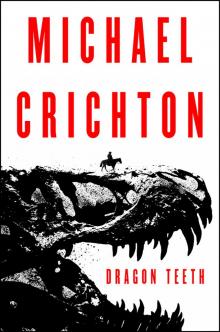 Dragon Teeth
Dragon Teeth Jurassic Park
Jurassic Park Micro
Micro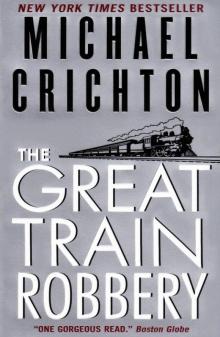 The Great Train Robbery
The Great Train Robbery The Andromeda Strain
The Andromeda Strain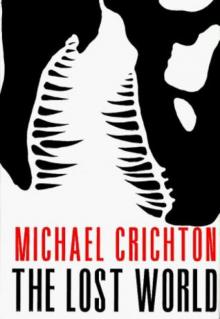 The Lost World
The Lost World Congo
Congo Travels
Travels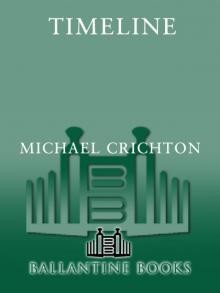 Timeline
Timeline Sphere
Sphere Westworld
Westworld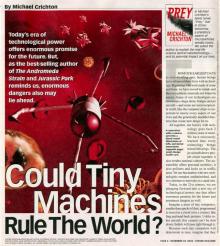 Prey
Prey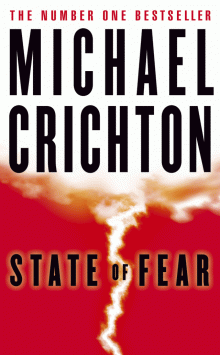 State Of Fear
State Of Fear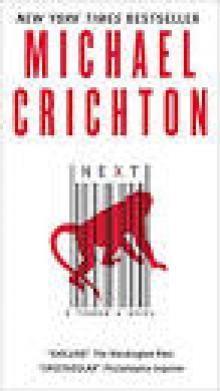 Next
Next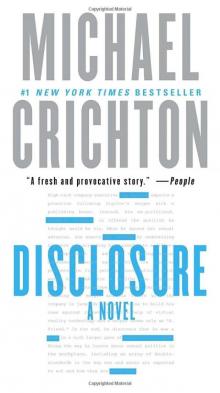 Disclosure
Disclosure Pirate Latitudes
Pirate Latitudes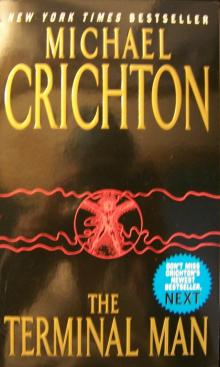 The Terminal Man
The Terminal Man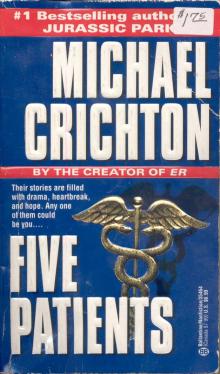 Five Patients
Five Patients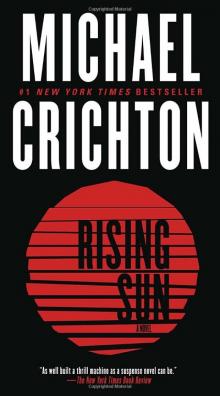 Rising Sun
Rising Sun Binary
Binary The Andromeda Evolution
The Andromeda Evolution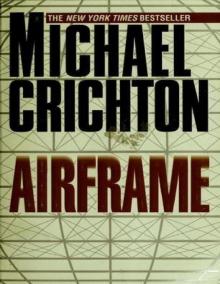 Airframe
Airframe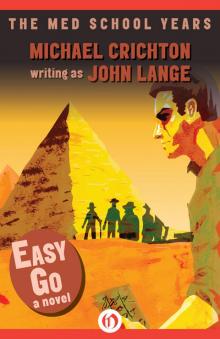 Easy Go
Easy Go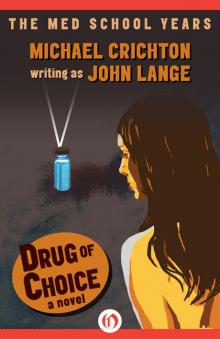 Drug of Choice
Drug of Choice Odds On: A Novel
Odds On: A Novel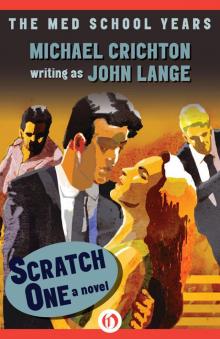 Scratch One
Scratch One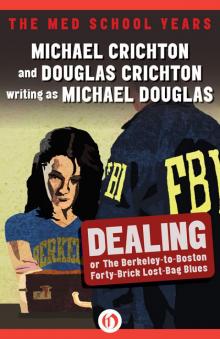 Dealing or The Berkeley-to-Boston Forty-Brick Lost-Bag Blues
Dealing or The Berkeley-to-Boston Forty-Brick Lost-Bag Blues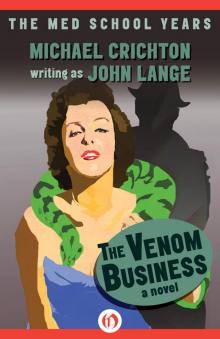 Venom Business
Venom Business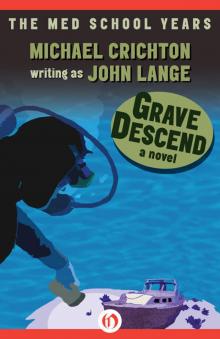 Grave Descend
Grave Descend Gold - Pirate Latitudes
Gold - Pirate Latitudes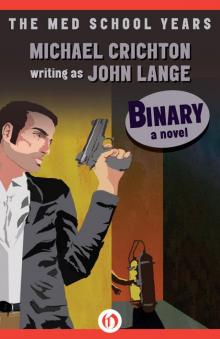 Binary: A Novel
Binary: A Novel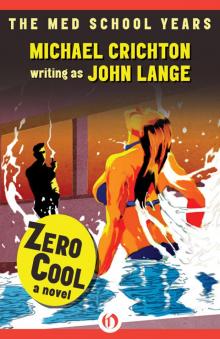 Zero Cool
Zero Cool Delos 1 - Westworld
Delos 1 - Westworld